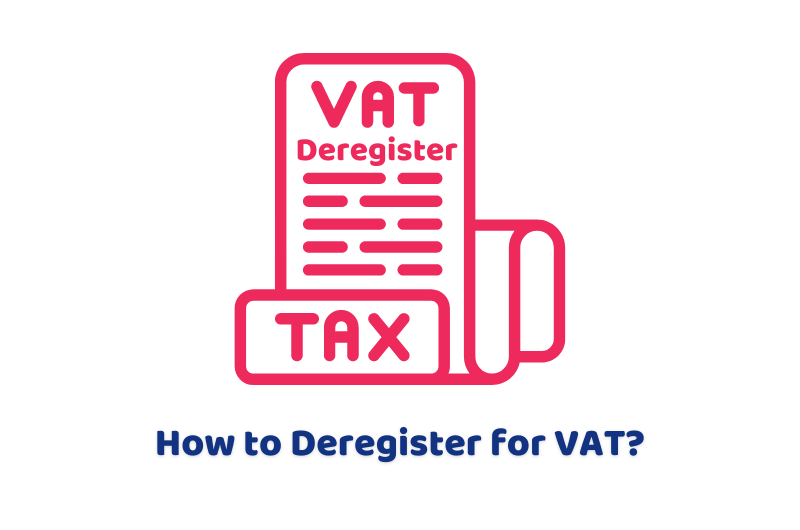Deregistering VAT in the UK refers to the process of cancelling a business’s VAT registration with HMRC. This means that the business will no longer be required to charge VAT on their goods or services, but they’ll also no longer be able to claim back VAT on their business expenses. A business can deregister for VAT if its taxable turnover falls below the VAT registration threshold or if they stop trading or selling taxable goods or services.
They’ll need to notify HMRC within 30 days of the date they stopped trading or the date their taxable turnover fell below the threshold. Deregistering for VAT can simplify a business’s accounting and record-keeping procedures, reduce costs, and make their prices more attractive to customers. However, it can also have some disadvantages, such as reduced credibility and limited growth potential.
Do you aim to create deregistering for VAT with the help of tech-savvy accountants at accountingfirms? Or need a guide about your tax problems in the UK? We can help!
What Does it Mean to Deregister for VAT?
You can deregister for VAT if your taxable turnover falls below the VAT registration threshold or if you stop trading or selling taxable goods or services. You’ll need to notify HMRC within 30 days of the date you stopped trading or the date your taxable turnover fell below the threshold.
Why Would a Business Deregister for VAT?
A business might deregister for VAT if its taxable turnover falls below the VAT registration threshold, which is currently £85,000. If their turnover falls below this threshold, they’ll no longer be required to register for VAT. Deregistering for VAT can also simplify a business’s accounting and record-keeping procedures, as they’ll no longer need to charge VAT on their goods or services or submit VAT returns to HMRC.
Additionally, if a business’s customers are mainly individuals or non-VAT registered businesses, deregistering for VAT can make their prices more attractive as they’ll no longer need to add VAT to their prices. The following points are to be focused in this regard.
- You no longer want to offer VAT-taxable products or services.
- Your business has stopped trading and other business activities.
- You are planning to sell your business.
- You aim to change the legal structure of your business.
- Your business has just joined a group that is for VAT registration.
- You now plan to join a scheme like the Agricultural Flat Rate Scheme.
Advantages and Disadvantages of VAT Deregistration
The advantages of VAT deregistration in the UK include the following points:
- Reduced administrative burden: Deregistering for VAT can simplify a business’s accounting and record-keeping procedures, as they’ll no longer need to charge VAT on their goods or services or submit VAT returns to HMRC.
- Lower costs: Deregistering for VAT means that a business will no longer need to pay VAT on its business expenses. This can help to reduce costs and improve cash flow.
- Attractive pricing: If a business’s customers are mainly individuals or non-VAT registered businesses, deregistering for VAT can make their prices more attractive as they’ll no longer need to add VAT to their prices.
- Competitive advantage: Deregistering for VAT can help a business to be more competitive in their market, as they’ll be able to offer lower prices than their VAT-registered competitors.
Moreover, the disadvantages of VAT deregistration in the UK include the following:
- Loss of input tax recovery: Deregistering for VAT means that a business will no longer be able to claim back VAT on their business expenses.
- Limited growth potential: If a business deregisters for VAT, it may be perceived as smaller and less established, which could limit its growth potential.
- Reduced credibility: Deregistering for VAT may reduce a business’s credibility in the eyes of some customers, suppliers, and other stakeholders.
- Limited customer base: Deregistering for VAT may limit a business’s customer base, as some customers may prefer to deal with VAT-registered businesses.
- Administrative complexities: If a business deregisters for VAT and then decides to re-register, it may face administrative complexities and additional costs.
The Bottom Line
Now that you have gathered a fair amount of information about deregistering VAT in the UK and how it benefits you there, we can bring the discussion towards wrapping up. The deregistration of VAT turns out to be a simple process, however, the pros and cons must be taken into serious consideration before getting into the procedure. This will help you to maximise the benefits and there will be no grey areas to handle. We hope these few minutes of reading will help you better understand the claim of the deregistration of the UK and how it is helpful for your business needs in the future.
The rules of tax gross-up become tricky when you have a higher chance of making an error in your returns. Our professional and detail-oriented accountants can help you! Get in touch with us.
Disclaimer: All the information provided in this article on deregistering VAT, including all the texts and graphics, is general. It does not intend to disregard any of the professional advice.

